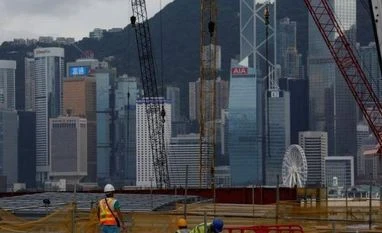Hong Kong stocks on Thursday fell by the most in over two months as investors dumped stocks across the board in late afternoon trading, spooked by warnings from China's central bank governor over the country's high debt levels.
The panic selling was also partly triggered by a slump in property shares, amid signs of tighter liquidity in Hong Kong and after data showed property sales in mainland China fell for the first time in over 2-1/2 years.
Also denting sentiment was news China's economic growth eased slightly in the third quarter, with investors scrambling to take profits in recently outperforming sectors such as auto and telecom amid concern there could be a further slowdown.
The Hang Seng index fell 1.9%, its biggest one-day drop since mid-August, to close at 28,159.09 points.
The China Enterprises Index tumbled 2.3% to 11,357.45 in its biggest decline since mid-December.
Most of the damage was done during the final hours of trading, as comments from central banker Zhou Xiaochuan spread through the market.
Zhou, speaking on the sidelines of China's 19th Communist Party congress, said China will fend off risks from excessive optimism that could lead to a "Minsky Moment", adding that corporate debt levels are relatively high and household debt is rising too quickly.
A Minsky Moment, named after economist Hyman Minsky, is a sudden collapse of asset prices after a long period of growth, sparked by debt or currency pressures.
"Zhou's comments emerged slowly during the day, and did weigh on the market," said Hao Hong, head of research at BOCOM International.
"He said deleveraging will be very, very painful, and financial regulation will be very very tight. These comments spooked investors."
Nearly all sectors fell, with an index tracking Hong Kong property stocks down 1.9% and financials sliding 2%.
Linus Yip, Hong Kong-based chief strategist at First Shanghai Securities, attributed the panic selling to the tumble in property shares.
But he said it was too early to call an end to the Hang Seng's 28% rally so far this year, arguing the 28,000-point level is still seen as strong support.
"Property shares were dumped because of signs of tighter liquidity as Hong Kong braces for another rate hike by the U.S. Federal Reserves," Yip said, pointing to a recent increase in interbank rates.
Hong Kong's one-month interbank rate rose to 0.59% on Thursday, nearing the eight-month peak hit on Oct 4.
Raw material shares also tumbled, after China data showed the country's economic growth slowed slightly in the third quarter to 6.8% from 6.9% in the second quarter.
While the number met economists' forecasts, comments from country's central bank governor at the weekend had raised expectations it may be stronger.
Traders focused more intently on property investment data, which showed September sales fell for the first time since early 2015 while construction starts slowed sharply.
Unlock 30+ premium stories daily hand-picked by our editors, across devices on browser and app.
Pick your favourite companies, get a daily email with all news updates on them.
Full access to our intuitive epaper - clip, save, share articles from any device; newspaper archives from 2006.
Preferential invites to Business Standard events.
Curated newsletters on markets, personal finance, policy & politics, start-ups, technology, and more.



)